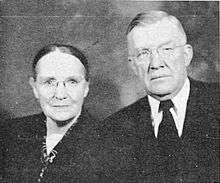Oscar W. McConkie
| Oscar W. McConkie | |
|---|---|
 Vivian and Oscar McConkie, ca. 1952 | |
| Born |
May 9, 1887 Buena Vista, Utah |
| Died | April 9, 1966 |
| Nationality | American |
| Occupation | Salt Lake City commissioner, Utah State Senator, leader in the LDS Church |
Oscar Walter McConkie (May 9, 1887 – April 9, 1966)[1] was a Utah State Senator and leader in The Church of Jesus Christ of Latter-day Saints (LDS Church). He was the father of Bruce R. McConkie, a member of the Quorum of the Twelve Apostles of the LDS Church. A second son, Oscar W. McConkie, Jr., was a member of the Utah State Senate.
Early years
McConkie was born in Buena Vista, Utah, a small town close to Moab, Utah. At the time, his father was sought by government officials for recognizing his three wives as such so not long after his birth, Oscar moved to Mexico. His father died in Pacheco, Galeana, Chihuahua in December 1890.
After his father's death, the family moved to Mona, Utah, where McConkie was raised. The McConkies moved to Moab when Oscar was ten years old. After graduating from Moab High School, McConkie attended the University of Utah. In 1913, he married Margaret Vivian Redd in the Salt Lake Temple. In 1914, McConkie began his studies at the University of Michigan, which led to his son, Bruce, being born in Ann Arbor.
Early career
After two years at law school, McConkie was having eye troubles and so returned to Utah. He worked as editor of the San Juan Record, based from Monticello, Utah, where he also practiced law until 1922.[2] In 1925, McConkie returned to Ann Arbor to finish his law studies at the University of Michigan after which he moved to Salt Lake City in the fall of 1926.
Judicial positions
McConkie served as a judge in San Juan County, Utah, from 1919 to 1922,[3] and Utah's Third District Court Judge, from 1928 to 1940. He also served as Salt Lake City commissioner.[4]
In 1940, McConkie unsuccessfully sought to be the Democratic candidate for Governor of Utah.
LDS Church service
Throughout his life, McConkie served in callings and leadership positions in the LDS Church. From 1920 to 1923, he was bishop of the Monticello Ward,[5] before becoming a counselor in the presidency of the church's San Juan Stake to Wayne H. Redd, his wife's uncle, from 1923 to 1925.[6] McConkie also served in the stake presidency of the Ensign Stake (in Salt Lake City) during the late 1930s and early 1940s. He later served as a member of the church's Sunday School General Board.[4] From 1946 to 1950, McConkie was president of the California Mission,[7] which then included most of California and a large part of Arizona.
Publications
McConkie's writings should not be confused with those by his son, Oscar W. McConkie, Jr.
- McConkie, Oscar W. (1944). The Holy Ghost: A Study of the Holy Ghost, According to the Standard Works of the Church. Salt Lake City, Utah: Deseret Book Company.
- —— (1945). A Dialogue at Golgotha: An Analysis of Judaism and Christianity, and of the Laws, Government and Institutions of the Jews, and the Jewish and Roman Trials of Jesus of Nazareth. Salt Lake City, Utah: Oscar W. McConkie.
Notes
- ↑ "Members researching Oscar W Mcconkie". Ancestry.com. Retrieved 2009-09-04.
- ↑ Son Bruce R. McConkie was born in 1915 and the article states: "His father practiced law in Monticello, Utah, until Bruce was 12.""In Memoriam: Elder Bruce R. McConkie, Advocate for Truth". New Era: 8. June 1985. Retrieved 2009-09-05.
- ↑ Utah State Law Library (May 7, 2008). "Utah Juvenile Court Judges Since Statehood" (PDF). Utah State Courts. State of Utah Judicial Council. Retrieved 2009-09-04.
- 1 2 Kenney, Scott G. (1987). "A Voice in the Wilderness, 1935-54". Memories and Reflections: The Autobiography of E. E. Ericksen. Salt Lake City, Utah: Signature Books. Retrieved 2009-09-04.
- ↑ Jenson, Andrew (1941). "Monticello Ward". Encyclopedic History of the Church of Jesus Christ of Latter-day Saints. Salt Lake City, Utah: Deseret News Press. p. 528. Retrieved 2009-09-05.
- ↑ Jenson, Andrew (1941). "San Juan Stake of Zion". Encyclopedic History of the Church of Jesus Christ of Latter-day Saints. Salt Lake City, Utah: Deseret News Press. p. 773. Retrieved 2009-09-05.
- ↑ "President Oscar W. McConkie". Los Angeles California Mission. LDS Mission Network. Retrieved 2009-09-04.
Sources
- McConkie, Joseph Fielding. The Bruce R. McConkie Story. (Salt Lake City: Deseret Book, 2003) p. 32-55.
Further reading
- McConkie, Joseph F. (1966). "Biography of Oscar W. McConkie". [Paper prepared for Graduate Religion 544]. Provo, Utah: Brigham Young University. Held in the Americana Collection of the BYU Harold B. Lee Library.
- Warrum, Noble; Morse, Charles W.; Ewing, W. Brown (1920). Utah Since Statehood: Historical and Biographical. 4. Chicago-Salt Lake: The S. J. Clarke Publishing Company. pp. 565–66.